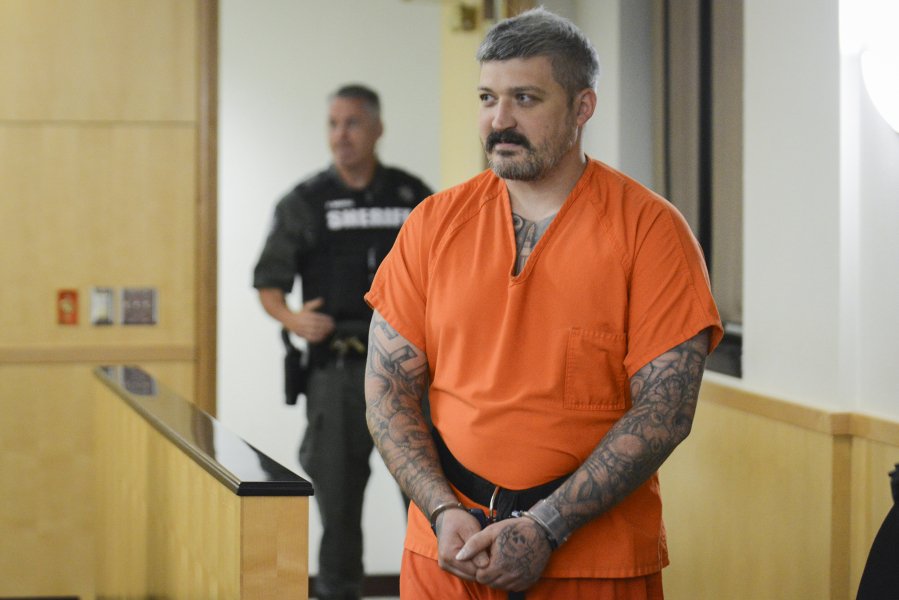Authorities say Brent Luyster, a former Vancouver man with a violent criminal past, was standing on the porch of a rural Woodland home when he shot two of his friends to death. He then allegedly barged inside the house and shot two women, only one of whom survived.
What occurred in a few moments now has prosecutors facing weeks of deliberation: Should Luyster face the death penalty if he is convicted of aggravated murder?
Besides demonstrating whether justice is served, their decision could cost local taxpayers more than $1 million. And as it stands now, it’s unlikely a death sentence would be carried out for many years.
Per state sentencing guidelines, a conviction of aggravated first-degree murder — the state’s only capital crime — requires a life-without-release sentence or the death penalty. However, Democratic Gov. Jay Inslee in 2014 placed a moratorium on executions in the state while he’s in office, and it doesn’t appear he plans to budge on the issue.
“The governor has been very clear this isn’t about individual cases but an unequal justice system that generates enormous costs and leaves families without closure,” Inslee’s deputy communications director, Tara Lee, wrote in an email Monday to The Longview Daily News.
Still, death penalty cases usually spend a decade or more in the courts. And the moratorium does not prevent prosecutors from pursuing capital punishment. They have 30 days from Luyster’s scheduled Aug. 24 arraignment to file the notice, though it’s likely his hearing will be pushed out further.
“This is an issue that prosecutor offices statewide wrestle with,” Clark County Prosecuting Attorney Tony Golik said. “We are in a difficult position as prosecutors in this state where we have the death penalty that is continuously approved by the voters. The law provides for that sentence in certain circumstances, but we also have, conversely, the governor’s position and also the knowledge that the Supreme Court has routinely reversed death penalty decisions.
“I respect the governor’s position, but each elected prosecutor is in a position to make our own independent decision on what to do in these cases,” Golik added.
Death penalty cases
There are currently nine inmates, all men, on death row, according to statistics tracked by the Death Penalty Information Center. They are housed at the Washington State Penitentiary in Walla Walla, where all executions are carried out.
According to the Washington Department of Corrections, 78 offenders have been executed in the state since 1904. None were women. Five men have been executed at Walla Walla since 1981, when Washington’s current capital punishment law was enacted.
Columbian archives show that the death penalty has been sought three times in Clark County since 1981.
Westley Allan Dodd was sentenced to die after pleading guilty to molesting and killing Vancouver brothers William and Cole Neer, ages 10 and 11, and Lee Iseli, 4, of Portland. Dodd, who was hanged in 1993, was the first person to be executed in Washington since 1965. He declined his court appeals.
Clark Hazen was sentenced to die in 1986 for the murder of two Fargher Lake residents, but he killed himself in prison while his case was on appeal.
James Leroy Brett was condemned to die after he killed Kenneth Milosevich Sr., a Hi-School Pharmacy executive, during a botched robbery at the victim’s Mount Vista home. Brett’s sentence was reversed, and he is serving a life term at Stafford Creek Corrections Center near Aberdeen.
The most recent case in which a defendant was put to death in Washington was Cal Brown in 2010 — more than 16 years after a King County jury found him guilty of torturing and killing 21-year-old Holly Washa of Burien.
An expensive process
In this area, only three attorneys are designated by the Washington Supreme Court to try capital cases: Vancouver attorney Bob Yoseph, Portland attorney Jeff Ellis and Battle Ground attorney Keith Goody. There are 48 attorneys statewide who are qualified to represent capital defendants at trial, according to the state Supreme Court Clerk’s Office.
All of these attorneys met special requirements to be added to the Supreme Court’s list, according to the Washington State Office of Public Defense. The requirements include: five years’ criminal trial experience; serving as lead counsel in at least nine jury trials of serious cases; serving as lead or co-counsel in at least one aggravated murder case; experience in preparing mitigation packages; and completion of at least one death penalty defense seminar within the previous two years.
Once appointed, the defense typically assembles a team early in the court proceedings and builds a case against capital punishment.
Most aggravated-murder defendants are indigent, so the county pays capital defense attorneys at an hourly rate of $125, Golik said. Prosecutors receive their normal salary; but oftentimes, two prosecutors are assigned to death penalty cases, which tend to be more time-consuming than non-death penalty cases. Deputy Prosecutors James Smith and Laurel Smith, from the major crimes and domestic violence units, respectively, are co-counsel in Luyster’s case.
It is normal practice to assign two lawyers, Golik said, in any case where there is an aggravated murder charge or the possibility of capital punishment.
Golik said it’s too soon to anticipate the cost of Luyster’s trial if his office seeks capital punishment. He also does not yet know if Luyster and his girlfriend, Andrea Sibley, who’s accused of rendering criminal assistance, will be tried together.
A recent study by Seattle University, which looked at 147 aggravated first-degree murder cases since 1997, found that Washington death penalty cases cost an average of $1 million more than non-death-penalty cases — $3.07 million compared with $2.01 million. This includes the cost of jailing defendants; defense and prosecution trial work; court, law enforcement and miscellaneous costs; appeals; and post-conviction incarceration.
The study, released in January 2015, also found that defense costs were about three times higher and prosecution costs about four times higher in capital punishment cases. It did not include the yearly incarceration costs for death row inmates versus those not on death row.
Appeals alone cost hundreds of thousands of dollars, in addition to an estimated $47,000 to $70,000 for court personnel, according to a 2006 report by the Washington State Bar Association.
Brett’s case cost Clark County more than $500,000 to appeal, according to Columbian archives.
“The most important facts are the facts of the case, the impact on the community, the impact on the surviving families,” Golik said. “Cost is one factor, but it certainly is not a binding factor. Justice always has a cost. You cannot say, ‘Well, it’s too expensive to seek justice in cases, in general.’ ”
There is potential financial assistance from the state, usually for smaller counties, Golik said. He does not anticipate Clark County would receive financial assistance if his office pursues the death penalty in Luyster’s case.
“This office is well-equipped to litigate this kind of case,” he said.




